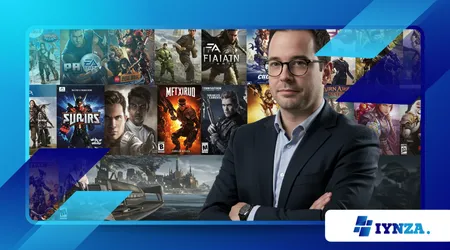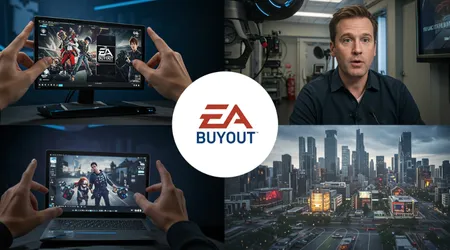EA buyout & impacto para o futuro dos jogos

The massive corporate shift at Electronic Arts (EA), announced on September 29, 2025, has sent shockwaves across the global gaming ecosystem.
Anúncios
The $55 billion leveraged buyout by a powerful consortium including the Public Investment Fund (PIF), Silver Lake, and Affinity Partners is a paradigm-altering event.
The implications of the EA Buyout & Impact on the Future of Gaming are vast, touching everything from subscription services to creative autonomy within major studios. This transition, the largest leveraged buyout in history, forces one of the world’s biggest publishers out of the public spotlight.
EA’s departure from the scrutiny of quarterly earnings reports opens doors to potential long-term investment, but the burden of immense acquisition debt introduces new, potentially harsher financial pressures.
We must critically examine how this privatization will reshape development pipelines, creative risk-taking, and consumer access to iconic franchises like The Sims, Battlefield, and Dragon Age. The outcome of this colossal deal defines the trajectory of a significant chunk of the industry.
Why Is the Leveraged Buyout Structure So Concerning for Developers?
The financial architecture of the acquisition, specifically the use of significant debt, creates a unique and immediate pressure on EA’s operations.
What Does the $20 Billion Debt Mean for EA’s Studios?
The new ownership is saddling EA with approximately $20 billion in debt financing. The company itself must now generate massive, stable revenue to service this obligation. This immediate, overriding financial necessity takes precedence over almost all other concerns.
Servicing this massive debt often translates into swift, aggressive cost-cutting measures. Historically, leveraged buyouts of this scale result in layoffs, studio closures, or the sale of non-core assets to raise cash quickly.
The focus shifts intensely to IPs with predictable, high-volume cash flow. Creative or niche studios with long development cycles and uncertain returns become immediate targets for restructuring or sale.
++ Biggest eSports Tournaments Announced This Month
How Will Privatization Change the Development Timeline Pressure?
While theoretically free from quarterly shareholder pressure, the studios now face the relentless demand of debt repayment. This new master might be less public but is arguably more ruthless.
The debt necessitates a strict prioritization of assets that can generate immediate, steady revenue, such as EA Sports FC and Madden NFL. Long-term, high-budget, narrative risks BioWare’s Dragon Age for instance must now justify their lengthy incubation period.
The crucial question remains whether the new owners will prioritize genuine, patient investment or rapid asset stripping to pay down the colossal acquisition debt. The answer will determine the ultimate nature of the EA Buyout & Impact on the Future of Gaming.

What Franchises Face the Biggest Creative Risk?
The studios behind EA’s narrative and simulation franchises are often cited as the most vulnerable to the financial reshuffling under the new private structure.
Why are BioWare and Maxis Facing High Uncertainty?
Studios relying on deep, single-player experiences like BioWare (Mass Effect) or ongoing cultural relevance like Maxis (The Sims) represent significant capital sinks with non-guaranteed returns. The new ownership consortium will scrutinize these studios heavily.
Also read: Code Vein 2 and Nioh 3: Release dates and details about these highly anticipated sequels.
Could BioWare Be Divested to Raise Liquidity?
Former BioWare veterans have publicly warned that the studio, despite its legacy, might be considered expendable. Selling off BioWare could immediately generate billions in liquidity to service the acquisition debt.
This threat is amplified by recent internal restructurings, including layoffs at BioWare in early 2025, signaling a pre-existing trend of cost optimization. The fate of narrative excellence is now tied directly to bond yields.
Read more: How Virtual Reality Games Are Revolutionizing Gameplay
What is the Threat to The Sims’ Broad Appeal?
The Sims franchise, while a consistent revenue generator, is built on a massive, creatively diverse community. There are concerns the new ownership might push for increased monetization that alienates this loyal, broad player base.
The shift in ownership, which includes parties with close political ties, has also sparked concern among the community about potential pressure on inclusive or diverse content within The Sims. Creative control is a major concern when analyzing the EA Buyout & Impact on the Future of Gaming.
How Will the Buyout Redefine the Gaming Market Structure?
The acquisition is not an isolated event; it is part of a larger, systemic consolidation trend reshaping the entire digital entertainment sector.
Does this Acquisition Encourage More Private Equity Investment in Gaming?
The massive scale of this deal signals to other private equity firms that gaming’s stable, high-margin revenue model is a ripe target for leveraged takeovers. This validates the sector as an institutional investment opportunity.
Is the Gaming Industry Splitting Into Two Distinct Models?
Analysts argue the industry is now rapidly splitting: the platform-centric model (dominated by Microsoft/Sony subscription libraries) and the private-equity model (focused on cash flow efficiency and monetization). Truly independent publishers will find it increasingly difficult to compete with either giant.
The proliferation of these private giants risks reducing the overall variety and experimental nature of triple-A games. This market consolidation is one of the most critical long-term facets of the EA Buyout & Impact on the Future of Gaming.
How Will This Impact Subscription Service Availability?
One crucial question is how the new, debt-laden EA will leverage its existing catalogue. They could pull IPs from existing subscription services (like Xbox Game Pass) to maximize direct sales revenue.
Conversely, they might choose to sell exclusive, high-value catalog access to one platform holder for a massive, single cash injection. The choice hinges on whether they prioritize long-term distribution or immediate debt repayment.
What is the Potential for a Creative and IP Revival?
Despite the overwhelming financial risks, the shift away from quarterly reporting does present a unique opportunity for EA to invest in long-dormant but beloved IP.
Why Could This Be an Opportunity for Dormant Franchises?
A private structure could allow the new leadership to approve a long, quiet development period three to four years for a high-budget reboot without facing public criticism over delays.
Which Forgotten IPs Could Benefit from Patient Investment?
Franchises like Dead Space, Titanfall, or Dungeon Keeper could be given the substantial budget and time needed for a true, ground-up revival. This patient, long-term approach could yield genuinely innovative titles, a positive potential outcome of the EA Buyout & Impact on the Future of Gaming.
Example: Instead of a yearly Battlefield release cycle which has historically damaged the franchise’s quality the studio could be given a four-year window for a singular, monumental title. The freedom to break the annual cycle is the true creative benefit of going private.
Analogia: The EA Buyout & Impact on the Future of Gaming is like trading the high-speed chaos of a public stock market race for the long, quiet marathon of private debt repayment.
While the public course was stressful, the private track is infinitely longer, with the risk of exhaustion (layoffs) or collapse (asset sales) far greater if the pace isn’t managed perfectly.
Key Financial and Industry Metrics Post-Acquisition (October 2025)
| Metric Category | Detail/Context (Source: Industry/Financial Reports 2025) | Critical Impact on Gaming Future |
| Transaction Structure | $55 Billion Leveraged Buyout (LBO) | Sets a record for debt-financed acquisitions in entertainment. |
| Debt Burden | $20 Billion in Debt Financing | Requires immediate, aggressive cost-cutting across all non-essential divisions. |
| Layoff Precedent | Over 1,000 layoffs across EA in 2024 and 2025, including BioWare. | Demonstrates a pre-existing trend toward efficiency, likely to intensify. |
| Market Consolidation | PE interest growing; follows Microsoft’s $69 Billion Activision deal. | Confirms industry shift toward a few large, centralized power structures. |
Conclusion: The Path Forward is Uncertain and Stressful
The $55 billion EA Buyout & Impact on the Future of Gaming represents a profound moment of paradox. EA has gained the theoretical freedom from quarterly shareholder myopia, but it has traded that for the absolute, unforgiving pressure of massive debt servicing.
The crucial determinants for the future of beloved franchises will be which leadership path prevails: the strategic, patient investment path that revives dormant IPs, or the financial triage path driven by the need to repay the $20 billion debt.
The industry watches, knowing that how EA handles this immense financial burden will set the precedent for every major publisher considering going private.
How do you believe the sheer size of the debt will influence the final creative output of EA’s biggest studios over the next three years? Share your predictions for BioWare or Maxis in the comments below!
Frequently Asked Questions (FAQ)
Q: Why is the $20 billion debt a bigger issue than a public company’s debt?
A: When a public company carries debt, it is often seen as a leverage tool. In an LBO, the debt is a condition of the sale and is essentially put onto the acquired company’s books.
This means EA’s operational cash flow must primarily go towards repaying the financiers, not necessarily toward R&D or expansion. This dynamic is the core of the EA Buyout & Impact on the Future of Gaming.
Q: Could the new ownership sell off non-gaming assets instead of studios?
A: Yes, that is highly likely. They could monetize peripheral assets like intellectual property licensing (film/TV rights) or non-core business units. However, selling a valuable, standalone studio like BioWare provides a much faster, larger lump sum to address the debt.
Q: Will the new EA focus more on microtransactions now?
A: It is a major concern. To generate predictable, high-margin revenue needed for debt repayment, the new private owners may intensify monetization within live service games (FC, Apex Legends, The Sims).
The pressure to maximize immediate revenue often drives a focus on microtransactions, a negative potential outcome of the EA Buyout & Impact on the Future of Gaming.
